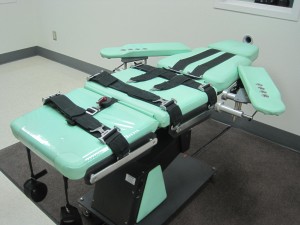
Gov. Jerry Brown has quietly ordered the State Department of Corrections on Thursday to begin considering new protocols, including a lethal injection with just one drug, which would allow the resumption of capital punishment.
The order was alluded to in a notice of appeal Thursday by Attorney General Kamala Harris. The state is appealing a December court order by a Marin County judge that once again halted executions. The ruling was a blow to California's attempt to resume capital punishment after it revised a three-drug protocol in response to a 2006 federal court decision. That ruling held that excruciating pain potentially felt by an executed inmate would constitute cruel and unusual punishment.
In response to a question about the order from KQED's Scott Shafer, the governor's office sent a one-sentence reply: "My administration is working to ensure that California's laws on capital punishment are upheld and carried out in conformity with our statutes."
The last inmate executed in California was convicted murderer Clarence Ray Allen in 2006.
Since California voters legalized the death penalty in 1978, the state has executed 13 inmates, while the number who linger on death row has climbed to more than 700.